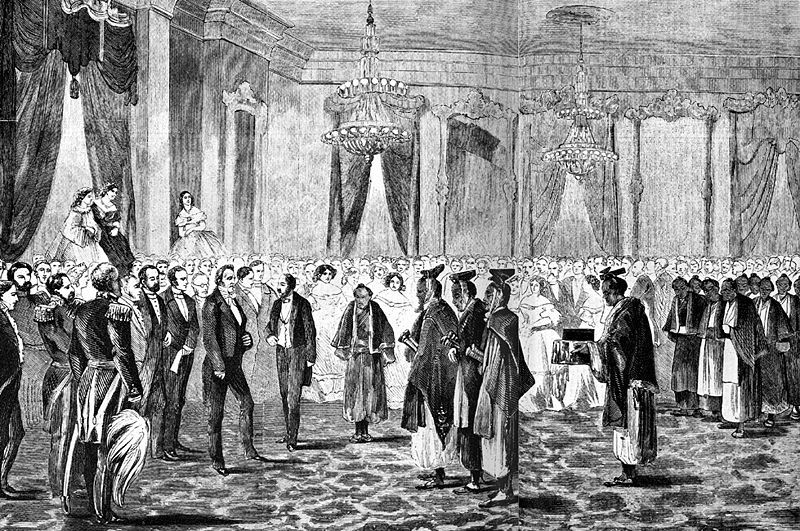“Punting the Pundits” is an Open Thread. It is a selection of editorials and opinions from around the news medium and the internet blogs. The intent is to provide a forum for your reactions and opinions, not just to the opinions presented, but to what ever you find important.
Thanks to ek hornbeck, click on the link and you can access all the past “Punting the Pundits”.
Follow us on Twitter @StarsHollowGzt
Katrina vanden Heuvel: Building a progressive alternative to ALEC
When it comes to moments in history, 1973 was not exactly a banner year for the Republican Party. The Senate Watergate Committee began its televised hearings in May. Spiro Agnew resigned in October. And President Nixon used a pre-Thanksgiving news conference at Disney World to unconvincingly assure the country that he was not, in fact, a crook. A tough year, indeed, for the grand old party.
But if you were a corporate conglomerate who dreamed of lower taxes and lax regulations and lesser rights for workers, 1973 was, ironically enough, a well-spring of new opportunity. That’s when a group of conservative activists joined together to engineer a different kind of burglary – one that involved forcibly entering cities and states with the intent to loot their working and middle classes.
The mechanism? A new organization dubbed the American Legislative Exchange Council, or ALEC. The idea? Don’t just lobby state and city governments; write the actual laws you want them to pass and then hand it out as model legislation. In the decades since its inception, ALEC has dismantled environmental regulations, pushed for school vouchers, compromised public safety by backing “stand your ground” laws and crippled unions with right-to-work legislation. [..]
Recently, the American Legislative and Issue Campaign Exchange and the Progressive States Network announced a merger to build an organization that will be focused on moving a progressive policy agenda in the states. While the goals of the new undertaking may resemble those of ALEC, their methods are vastly different. They will operate transparently, use no lobbyists, and make their model legislation and resources available to everyone; their database already showcases 1,800 examples of progressive legislation. And they will engage with people, not corporations.
Ana Marie Cox: The problem with the Koch brothers isn’t their politics. It’s their copycats
Billionaire mega-donors care less about funding parties than enacting policies. Others are following suit
Did you see the “Creepy Carnival” from the Koch brothers on the Washington Mall the other day? Sponsored by the youth-outreach tentacle of the brothers’ operation, it featured Pennywise the Clown doppelgangers dunking millennials into “High-Risk Pools” – though, surely, they missed an opportunity to nail some old people to death panels. (There was no word about the presence of funhouse mirrors to artificially shrink the outsize influence of the Kochs on our national agenda.)
These two men have commanded center stage in the dark-money circus since the US supreme court started the political money free-for-all four and a half years ago. The Kochs have become the focus of electoral campaigns themselves.
But however effective they may be as conservative bogeymen, the real problem with the Kochs is not that they are ultra-conservative. The problem is that they are a leading indicator that our political system is morphing from elections based on ideology to elections based on the preferences of individual donors.Did you see the “Creepy Carnival” from the Koch brothers on the Washington Mall the other day? Sponsored by the youth-outreach tentacle of the brothers’ operation, it featured Pennywise the Clown doppelgangers dunking millennials into “High-Risk Pools” – though, surely, they missed an opportunity to nail some old people to death panels. (There was no word about the presence of funhouse mirrors to artificially shrink the outsize influence of the Kochs on our national agenda.)
These two men have commanded center stage in the dark-money circus since the US supreme court started the political money free-for-all four and a half years ago. The Kochs have become the focus of electoral campaigns themselves.
But however effective they may be as conservative bogeymen, the real problem with the Kochs is not that they are ultra-conservative. The problem is that they are a leading indicator that our political system is morphing from elections based on ideology to elections based on the preferences of individual donors.
There’s no point in relying on men to rescue women
“A woman without a man is like a fish without a bicycle,” a phrase coined by Australian activist Irina Dunn in 1970 and commonly attributed to Gloria Steinem, expressed a primary goal of second-wave feminism: female independence. Liberal feminists of that era, including Betty Friedan and Gloria Steinem, spoke of men as partners and potential allies, not enemies and oppressors. Their kind of feminism wasn’t about rejecting men entirely; it was about freeing women to live without them (or, for those who wanted men in their lives, to enjoy their company on equal terms). Men were nice to have around, if you were straight and found a good one, but come the revolution, no woman would have to stick with a bad one out of economic, social or emotional necessity. [..]
Women who aspire to positions of power are today advised to marry well, not advocate for themselves too forcefully and garner the support of powerful men. This isn’t bad advice: Having a partner does make it easier to devote yourself to work; you are likelier to advance as a woman or minority if you’re not seen as a pushy whiner, and currying favor with men in power probably helps more than it hurts (unless you’re perceived as sleeping your way to the top). But relying on a man for money and power, whether he’s your husband or a senior executive at your company, is not a bold feminist act. It may or may not leave individual women stronger, but it leaves women as a group weaker.
Kari Lydersen: Is Rahm Emanuel doomed?
The Chicago mayor’s political capital is drying up, thanks to his autocratic style and unpopular education policies
In some ways, Chicago Mayor Rahm Emanuel and Karen Lewis, the fiery president of the Chicago Teachers Union, are very much alike – profane, tough, outspoken, unapologetic. Both are Jewish, and both are ardent fans of ballet.
But a face-off between the two in the city’s 2015 mayoral election – should Lewis decide to run – would be a clear referendum on two wildly different versions of politics and views of the city’s future.
That such a contest might be on the horizon shows how Emanuel’s cavalier, steamroller style of governance has alienated Chicago voters, invoked racial and class tensions and made one of the country’s most feared political operatives potentially vulnerable to an unorthodox challenger out of left field.
A poll released by The Chicago Sun-Times on July 14 showed Lewis – an outspoken former chemistry teacher who has led the teachers’ union for four years – beating Emanuel by 9 percentage points in a one-on-one matchup, with 45 percent of voters choosing Lewis and 36 percent choosing Emanuel.
The result came as a shock to many political observers. Lewis, who is African-American, has no previous experience with electoral politics outside the union. Some are repulsed by her brash demeanor. [..]
That an unconventional contender such as Lewis is winning over people across the demographic spectrum shows just how upset Chicagoans are with Emanuel’s autocratic style, his dedication to Big Business and flashy downtown startups at the expense of regular residents and neighborhoods and – perhaps most significant, given Lewis’ standing in the teaching community – his drastic moves to restructure the public school system.
Donna Smith: Churning for Dollars – There Ought to Be a Law
Remember Liz Fowler? She was the Wellpoint executive who took a brief sabbatical from her direct paychecks from the private health insurance industry to write the Affordable Care Act while working for Senator Max Baucus. Once that project was wrapped up, Liz went to work briefly for the U.S. Department of Health and Human Services as she transitioned her way back to work as a lobbyist for health industry giant Johnson & Johnson. [..]
Now, in Colorado, we’re seeing Patty Fontneau, the CEO of the health insurance exchange, making her departure to return to private industry. Fontneau will take a position as president of health insurance giant CIGNA’s private exchange business. Prior to heading up the exchange, she worked for a law firm and in finance. No doubt her new role at CIGNA will provide her an income that supports the lifestyle to which she became accustomed while earning nearly $200,000 annually (plus bonuses) as the head of the Colorado exchange. It’s a safe bet she never had to apply for or worry about any tax credits or subsidies to cover her own health insurance premiums. [..]
Health care needs to be treated as a public good and a human right. CIGNA certainly is not in the business of providing that. Health insurance is not health care. Health insurance is a financial product sold to us to protect health and wealth which may do neither thing very well at all. So we weren’t duped by Fowler or Fontneau as they worked to help the health industry from the inside or as they left to do similar work more directly from outside the public administration of Obamacare. We patients and private citizens were always the means to an end – higher profits for the health industry and bigger salaries for those who help make it so. As an old adage goes and has ever stayed true, ‘Follow the money.”
Naomi Oreskes: Wishful Thinking About Natural Gas
Why fossil fuels can’t solve the problems created by fossil fuels
Albert Einstein is rumored to have said that one cannot solve a problem with the same thinking that led to it. Yet this is precisely what we are now trying to do with climate change policy. The Obama administration, the Environmental Protection Agency, many environmental groups, and the oil and gas industry all tell us that the way to solve the problem created by fossil fuels is with more fossils fuels. We can do this, they claim, by using more natural gas, which is touted as a “clean” fuel — even a “green” fuel.
Like most misleading arguments, this one starts from a kernel of truth.
That truth is basic chemistry: when you burn natural gas, the amount of carbon dioxide (CO2) produced is, other things being equal, much less than when you burn an equivalent amount of coal or oil. It can be as much as 50% less compared with coal, and 20% to 30% less compared with diesel fuel, gasoline, or home heating oil. When it comes to a greenhouse gas (GHG) heading for the atmosphere, that’s a substantial difference. It means that if you replace oil or coal with gas without otherwise increasing your energy usage, you can significantly reduce your short-term carbon footprint.Albert Einstein is rumored to have said that one cannot solve a problem with the same thinking that led to it. Yet this is precisely what we are now trying to do with climate change policy. The Obama administration, the Environmental Protection Agency, many environmental groups, and the oil and gas industry all tell us that the way to solve the problem created by fossil fuels is with more fossils fuels. We can do this, they claim, by using more natural gas, which is touted as a “clean” fuel — even a “green” fuel.
Like most misleading arguments, this one starts from a kernel of truth.
That truth is basic chemistry: when you burn natural gas, the amount of carbon dioxide (CO2) produced is, other things being equal, much less than when you burn an equivalent amount of coal or oil. It can be as much as 50% less compared with coal, and 20% to 30% less compared with diesel fuel, gasoline, or home heating oil. When it comes to a greenhouse gas (GHG) heading for the atmosphere, that’s a substantial difference. It means that if you replace oil or coal with gas without otherwise increasing your energy usage, you can significantly reduce your short-term carbon footprint.[..]
So if someone asks: “Is gas better than oil or coal?” the short answer seems to be yes. And when it comes to complicated issues that have science at their core, often the short answer is the (basically) correct one. [..]
In the case of gas, however, the short answer may not be the correct one.





Recent Comments